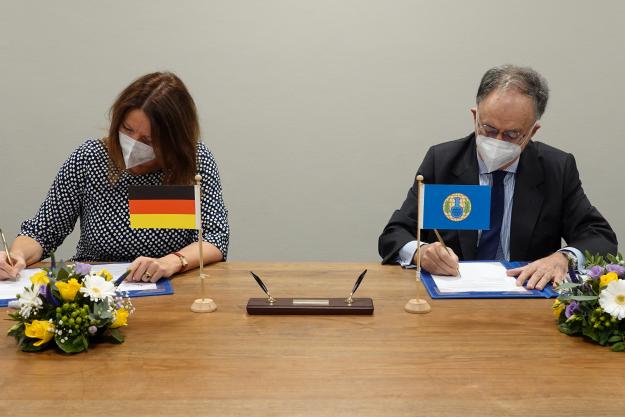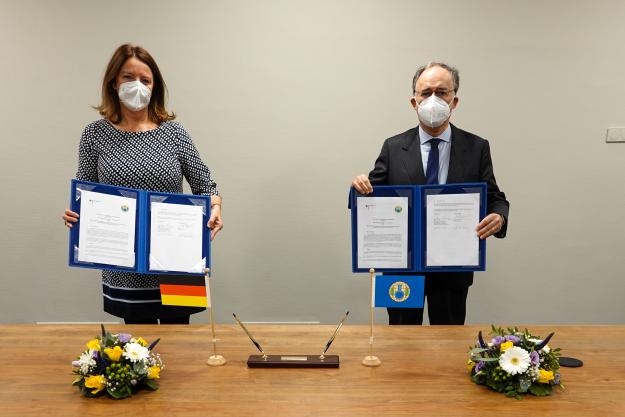
Permanent Representative of the Federal Republic of Germany to the OPCW, H.E. Mrs. Gudrun Lingner, and the Director General of the OPCW, H.E. Mr Fernando Arias
THE HAGUE, Netherlands–1 December 2021–The German Federal Government has contributed €1 million to the Organisation for the Prohibition of Chemical Weapons (OPCW) Trust Fund for Training, of which €500,000 for a project to enhance the analytical capability of laboratories in African Member States, and €500,000 for training OPCW inspectors and other staff involved in non-routine missions, investigations, and technical assistance visits.
The contributions were formalised today during a ceremony between the Permanent Representative of the Federal Republic of Germany to the OPCW, H.E. Mrs. Gudrun Lingner, and the Director General of the OPCW, H.E. Mr Fernando Arias.
Ambassador Lingner stated: “The OPCW must rise to the challenge of a new era of chemical weapons threats. The Centre for Chemistry and Technology (CCT) will be a cornerstone of this endeavour. Germany wants to support programmes that will be implemented at the CCT once completed. I am very happy the German Federal Government has made an additional voluntary contribution of €1 million to strengthen training efforts in two areas: €500,000 for CCT training programmes that will increase OPCW staff’s capacity for non-routine missions. With the second half of the €1 million contribution, Germany wishes to enhance capacity-building programmes for African laboratories, adding to our overall support for the Africa programme.”
The Director-General expressed thanks to Germany, stating: “This contribution will help the OPCW harness the potential of the Chemtech Centre as a cutting-edge training facility for the benefit of all Member States. The projects supported by these funds, relating to broadening the network of OPCW Designated Laboratories, and non-routine mission training, will strengthen the Organisation’s readiness to respond to a changing threat landscape and make our operations more resilient.”

Background
The ChemTech Centre seeks to strengthen the OPCW’s capabilities to fully address new and emerging chemical weapons threats, as well as to support capacity building in OPCW Member States. A new facility is required to meet the demands of OPCW Member States for enhanced verification tools, improved detection capabilities and response measures, as well as increased capacity building activities. The ChemTech Centre will also help the OPCW to keep pace with developments in science and technology and new chemical weapons threats. Construction of the ChemTech Centre started in June 2021 and is planned to be finished by the end of 2022.
The OPCW Trust Fund for Training enables the professional development of OPCW personnel in support of various activities, including non-routine inspections, fact-finding missions, investigations, and provision of technical assistance. It contributes to enhancing and sustaining the readiness of the Secretariat to carry out both routine and non-routine operations and helps staff adapt their knowledge and skills to evolving requirements.
The OPCW’s Designated Laboratories network is a linchpin of the Organisation’s verification regime and its capacity to investigate allegations of the use of chemical weapons. In the framework of the OPCW Africa Programme, the project proposed by Germany is aimed at enhancing capacities of analytical laboratories in the African region and consists of two main sub-programmes: laboratory twinning with the CCT laboratory and equipment maintenance training, complemented with a general training programme to enhance the capabilities of selected laboratories that support customs service in the region.
As the implementing body for the Chemical Weapons Convention, the OPCW, with its 193 Member States, oversees the global endeavour to permanently eliminate chemical weapons. Since the Convention’s entry into force in 1997, it is the most successful disarmament treaty eliminating an entire class of weapons of mass destruction.
Over 98% of all declared chemical weapon stockpiles have been destroyed under OPCW verification. For its extensive efforts in eliminating chemical weapons, the OPCW received the 2013 Nobel Peace Prize.
